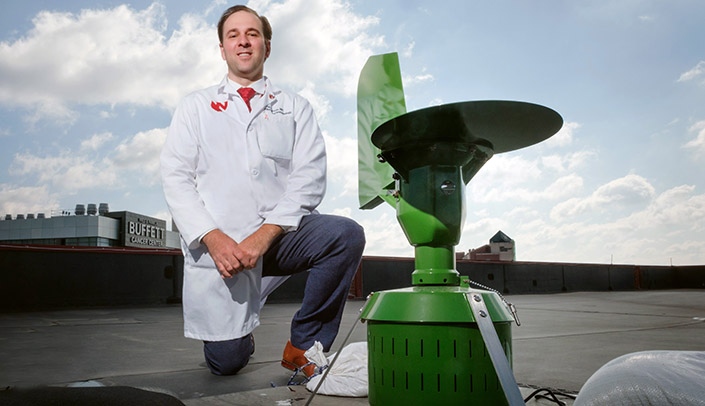If you have a dog and you suffer from pollen allergies, you might consider wiping them down with a wet towel whenever they come back into your house after going outside.
That’s because tree and grass pollen season will soon be near its peak and those little fur babies are walking pollen collectors, said Andrew Rorie, MD, an assistant professor in the UNMC Division of Allergy & Immunology.
Dr. Rorie has been counting pollen in the Omaha area since late 2020 when he installed a volumetric air sampler on the roof of the Durham Research Center II.
This fancy little green machine, sporting a tail fin and canister-like body, is designed to sample airborne particles continuously for seven days, at which point the samples are collected by Amy Nelson, lab manager for Jill Poole, MD, and Rhonda Walenz, a research coordinator in the division of allergy and immunology.
The samples are then stained and analyzed under a microscope for identification and the results are reported every Tuesday and Thursday on the UNMC Allergy/Immunology homepage, on Twitter and Facebook and can be accessed via QR codes provided on the homepage.
It’s useful to know what you are allergic to, Dr. Rorie said, and suggests individuals talk to their physician about getting tested.
“When you know what you are allergic to then you can use the pollen count data to know when to be on top of your meds,” he said.
Dr. Rorie also suggests that when pollen counts are high, taking simple measures can help alleviate suffering.
These include:
- Closing windows in your house or car;
- Changing your clothes as soon as you come in from working outdoors;
- Taking a shower to rinse any residual pollen off your skin; and
- Using a sinus rinse to clear your nose of pollen.
Individuals also should pay attention to how windy it is outside. Windy days, like the ones in late April, play a role in how much pollen is circulating in the air and from what part of the country, Dr. Rorie said.
“Cedar tree pollen labeled in Texas has been collected as far north as Ontario Canada.”
Unfortunately, Dr. Rorie said, every continent is facing longer and more abundant pollen seasons, whether that is grass, tree or weed pollen.
